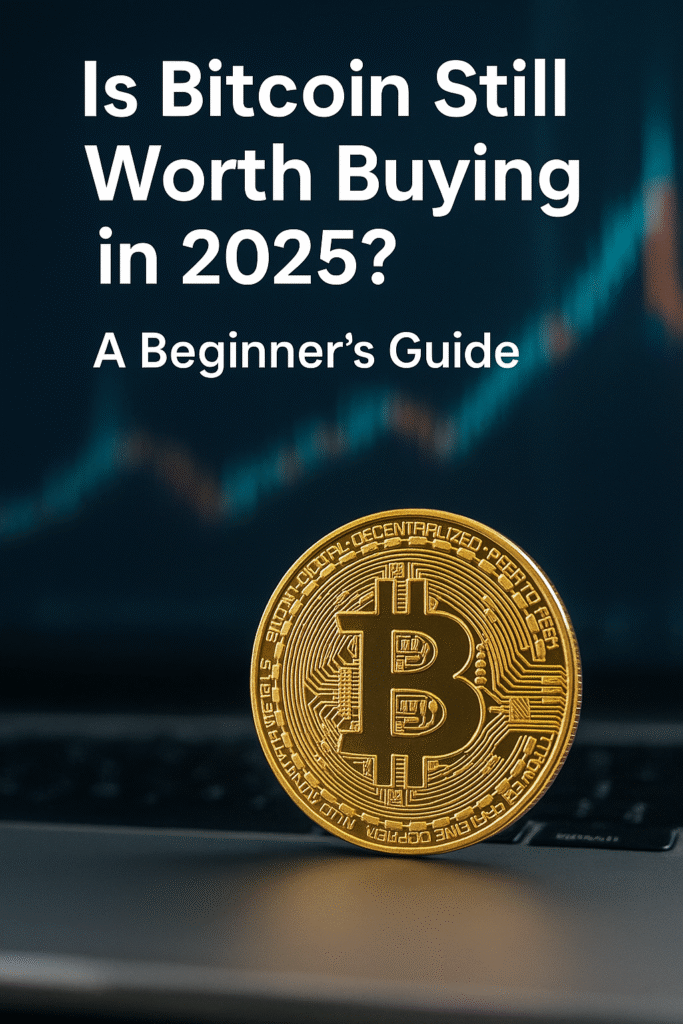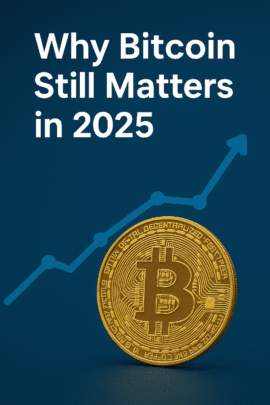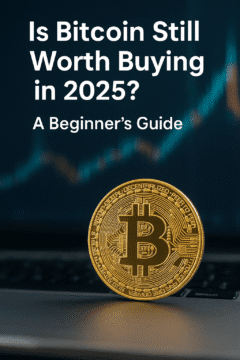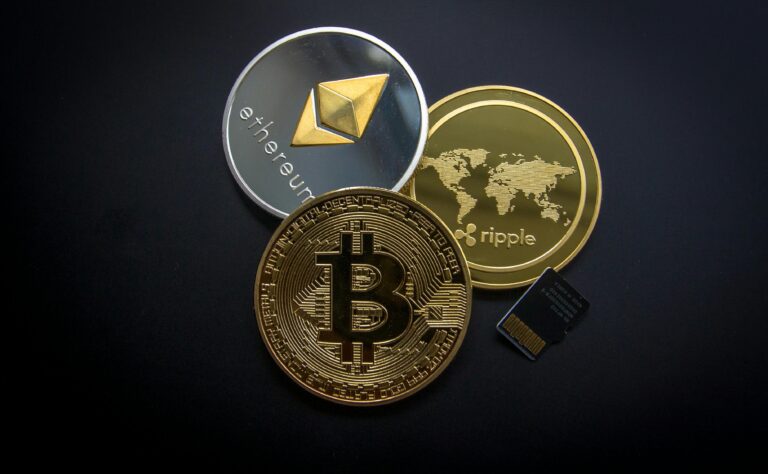Is Bitcoin Still Worth Buying in 2025? A Beginner’s Guide
If you’ve been watching the financial news lately or scrolling through social media, you’ve probably noticed that Bitcoin is still one of the hottest topics in the investing world. But here’s the real question: Is Bitcoin still worth buying in 2025, especially if you’re new to investing?
This guide will break everything down in a simple, trustworthy, and professional way. Whether you’re just thinking about investing or you’ve already dipped your toes into the world of finance, by the end of this post you’ll have a clear idea of what Bitcoin is, why it’s important, and whether it deserves a place in your investment portfolio in 2025.

Chapter 1: Understanding Bitcoin — A Quick Refresher
Before we can decide whether Bitcoin is worth buying in 2025, let’s quickly recap what it actually is.
- Bitcoin is digital money. It was invented in 2009 by an unknown person (or group) using the name Satoshi Nakamoto. Unlike dollars, euros, or yen, Bitcoin isn’t controlled by a government or central bank.
- It runs on a blockchain. Think of the blockchain as a public digital ledger that records every Bitcoin transaction ever made. It’s transparent, secure, and almost impossible to tamper with.
- Limited supply. Only 21 million Bitcoins will ever exist. This scarcity is one of the reasons why people compare it to “digital gold.”
- Volatility. Bitcoin’s price has been famously unpredictable. It has created millionaires overnight—and also caused many to panic sell.
If you’re brand new, think of Bitcoin as a new type of asset, like stocks or real estate. Some people buy it to make short-term profits, while others treat it as a long-term store of value.
Chapter 2: Bitcoin’s Journey So Far
To understand where Bitcoin might go, it helps to see where it’s been.
- 2009–2012: The Early Days
Bitcoin was virtually worthless when it first launched. Famously, someone paid 10,000 BTC for two pizzas in 2010. Today, that would be worth billions. - 2013–2017: Growing Attention
Bitcoin started to attract global interest. It climbed past $1,000 for the first time in 2013 and surged to nearly $20,000 in 2017. - 2018–2020: Big Swings
Bitcoin fell sharply after 2017, dropping below $4,000. But it gradually recovered, with investors calling it “digital gold.” - 2021–2023: Mainstream Moment
Bitcoin hit an all-time high of around $69,000 in late 2021. Institutions, hedge funds, and even countries like El Salvador began adopting it. However, the market also faced downturns as global economic conditions shifted. - 2024–2025: Where We Are Now
By 2025, Bitcoin has proven it’s not a passing trend. It’s one of the most recognized and traded assets in the world. Regulatory clarity is slowly improving, and Wall Street continues to integrate Bitcoin into financial products.
Chapter 3: Why Bitcoin Still Matters in 2025
So, with all the ups and downs, why are people still talking about Bitcoin?

1. Scarcity
With only 21 million coins ever to exist, Bitcoin is scarce like gold. Unlike traditional money, governments can’t print more Bitcoin. Why Is Bitcoin Valuable? Breaking Down Scarcity, Security & Adoption – CCN.com.
2. Hedge Against Inflation
Many investors see Bitcoin as protection against inflation. As central banks print more money, Bitcoin’s fixed supply becomes attractive. Is Bitcoin a hedge against inflation in 2025? – Cointelegraph.
3. Global Accessibility
Anyone with internet access can buy, send, or receive Bitcoin. This opens financial opportunities for people in countries with unstable currencies.
4. Growing Institutional Adoption
Banks, funds, and even payment companies are offering Bitcoin-related products. This is giving it more credibility and accessibility.
5. Technological Innovation
The Bitcoin network is becoming faster and more efficient. Second-layer solutions like the Lightning Network allow near-instant, low-cost payments.
In short, Bitcoin is still relevant in 2025 because it combines financial utility, scarcity, and global recognition.
Chapter 4: The Case for Buying Bitcoin in 2025
If you’re wondering whether Bitcoin is still worth buying, here are the top reasons many investors think it is:
- Proven Resilience: Despite multiple “crashes” and negative press, Bitcoin has always bounced back stronger.
- Store of Value: Like gold, it’s becoming an asset people hold to preserve wealth over time.
- Diversification: Bitcoin doesn’t move in perfect sync with traditional stocks and bonds, which makes it an interesting addition to portfolios.
- Potential Growth: While no one can guarantee future prices, many experts believe Bitcoin still has room to grow, especially as adoption continues.
Chapter 5: The Risks You Need to Know
Of course, no investment is risk-free—and Bitcoin is no exception. Here are the major risks to keep in mind:
- Volatility
Bitcoin’s price can swing dramatically. A sudden drop of 20% in a week is not unusual. - Regulatory Uncertainty
Governments are still figuring out how to regulate Bitcoin. Future rules could impact its price or use. - Security Risks
While Bitcoin itself is secure, exchanges and wallets can be hacked if not protected properly. - No Guarantee of Profit
Just because Bitcoin has grown a lot in the past doesn’t mean it will continue at the same pace.
Chapter 6: How Beginners Can Approach Bitcoin in 2025
If you’re new to investing, you don’t need to dive in with huge amounts of money. Here’s a safe, step-by-step approach:
Step 1: Learn Before You Buy
Understand how Bitcoin works, how to store it safely, and the risks involved.
Step 2: Start Small
You don’t need to buy a whole Bitcoin. With fractional investing, you can buy as little as $10 worth.
Step 3: Choose a Reputable Platform
Stick to well-known, regulated exchanges or brokerages. Examples include Coinbase, Binance, or traditional financial platforms that now offer Bitcoin.
Step 4: Store It Safely
For long-term holding, consider using a hardware wallet (a small USB-like device) instead of leaving your Bitcoin on an exchange.
Step 5: Use Dollar-Cost Averaging (DCA)
Instead of trying to time the market, invest a fixed amount regularly (e.g., $50 every month). This strategy reduces the impact of short-term volatility.
Step 6: Think Long-Term
Treat Bitcoin like a marathon, not a sprint. Many investors who benefited most are the ones who held on for years, not weeks.
Chapter 7: Frequently Asked Questions
1. Do I need thousands of dollars to buy Bitcoin?
No. You can start with as little as $10 or $20.
2. Can Bitcoin go to zero?
While it’s unlikely at this point, it’s not impossible. That’s why it’s important to only invest money you can afford to lose.
3. Is Bitcoin legal?
In most countries, yes. But always check your local laws before buying.
4. Should I trade or hold long-term?
For beginners, long-term holding is usually less stressful than trying to trade.
5. What about taxes?
Bitcoin profits are usually taxable. Check your country’s rules on crypto taxes.
Chapter 8: What Experts Predict for Bitcoin in 2025 and Beyond
No one can predict the future, but many analysts and investors share interesting perspectives:
- Some believe Bitcoin could eventually reach six-figure prices as adoption continues.
- Others caution that regulation could slow down growth.
- A growing number of traditional financial institutions treat Bitcoin as a permanent asset class, suggesting it’s here to stay. Five longer-term takeaways from the latest bitcoin rally, according to Deutsche Bank – MarketWatch.
Remember: Predictions are educated guesses, not guarantees.
Chapter 9: Is Bitcoin Right for You?
Bitcoin isn’t a one-size-fits-all investment. Ask yourself these questions:
- Am I comfortable with high risk and volatility?
- Do I believe in the long-term potential of digital money?
- Am I willing to hold through ups and downs?
If you answered “yes” to most of these, Bitcoin may deserve a place in your portfolio.
If not, it’s okay to wait, watch, and keep learning. Sometimes the best investment is patience.
Chapter 10: Final Thoughts — Should You Buy Bitcoin in 2025?
So, is Bitcoin still worth buying in 2025? The answer is: it depends on your goals and risk tolerance.
- If you’re looking for a quick win, Bitcoin’s volatility may frustrate you.
- If you’re thinking long-term and want exposure to a scarce, globally recognized asset, Bitcoin could be a smart addition.
Big Things Still Possible for Bitcoin in 2025 – ETF Trends.
Practical Tips for Beginners
If you’re considering Bitcoin in 2025, one of the most important things to remember is to start simple and stay consistent. Rather than trying to predict price swings or rushing to invest large amounts, begin with a small, manageable sum and use a steady approach like dollar-cost averaging (investing the same amount regularly over time). This helps smooth out volatility and reduces the pressure of timing the market perfectly. Equally important is security—make sure you store your Bitcoin safely, ideally in a hardware wallet, rather than leaving it on an exchange. Finally, keep a long-term perspective: Bitcoin has seen many ups and downs, but those who focused on gradual growth and patience have historically been rewarded more than those who chased quick gains. In short, invest only what you can afford to lose, protect it wisely, and let time work in your favor.
The most important thing is to approach Bitcoin with knowledge, caution, and a long-term perspective. Start small, diversify your portfolio, and remember—investing is a journey, not a race.
A Beginner’s Takeaway
- Bitcoin is still relevant and valuable in 2025.
- It’s risky but potentially rewarding.
- Beginners should start small, learn continuously, and avoid emotional decisions.
- Never invest more than you can afford to lose.
In the end, Bitcoin is not just about money—it’s about being part of a financial revolution. Whether you choose to buy now or just observe, you’re witnessing history in the making.

